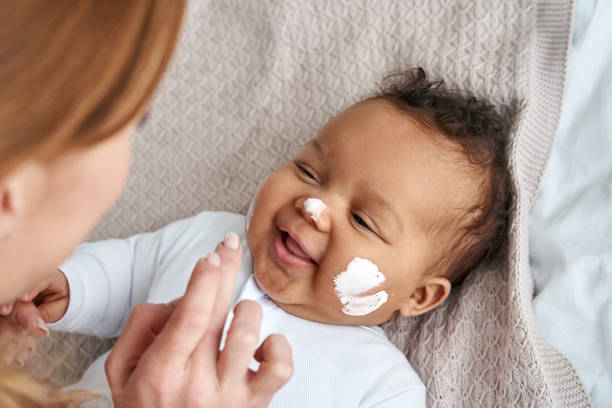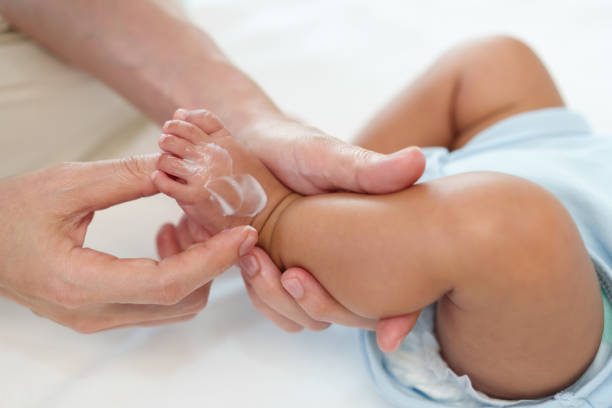Baby Skincare
All parents desire to provide their child with top quality advantages yet skin care for the baby requires particular focus. It remains essential for new parents to both choose proper skincare products for infants and follow appropriate child skincare practices due to their delicate skin condition. The following article presents information about Baby Skincare while also providing instructions to prevent hard skin development in babies along with vital guidance for new parents.

Why Baby Skincare is Important
The thinness of baby skin measures ten times greater than adult skin. The skin of babies from this region responds more intensely to irritants and tougher than the Middle Asian skin type. A baby’s skin remains fragile and easily dries because of its sensitivity leading to both diaper rash and eczema development. The avoidance of adverse effects on the skin is achieved through appropriate care and by making babies feel good about their appearance and body.
During infancy the important developmental stages coincide with the skin remaining delicate due to prenatal circumstances. Support for the transition process becomes more accessible when following a Baby Skincare because the routine establishes strong skin care habits for future use.
Essential Elements of Baby Skincare
When dealing with Baby Skincare, people must focus on essential miniaturization together with UV protection and proper product choice. Several guidelines exist to help caregivers take proper care of their baby’s skin.
1. Gentle Cleansing
The proper choice of cleanser at the beginning of skin washing remains essential due to risks of damaging your skin with inappropriate cleansers. Babies bathe rarely while the chosen cleansing agent should be unscented baby wash or mild soap. Those who have babies recommend avoiding the use of products with bleach and intense aromas because these chemicals may damage newborn skin. Parents should select baby products that have both non-allergic character and dermatological testing because these standards ensure their skin remains unharmed.
2. Moisturizing Regularly
The bath session ends by using baby moisturizer which avoids skin irritation to the infant. The skin of newborns naturally produces a lubricating substance that soap removal through water washes away. The application of baby lotion or cream helps protect body moisture so the skin becomes smooth and free of dryness. Toddlers can handle specific products that remain free of scents and show gentle properties suited to their needs.
3. Diaper Rash Prevention
Among babies, diaper rash stands as the most common dermatological condition that exists. To prevent discomfort one should regularly check and dry their baby’s buttocks area. Frequent burping and regular feeding intervals should be maintained when washing diapers with rubber gloves and applying ointments on the delicate skin surface. Swapping alcohol-based wipes for a different alternative and adjusting diaper fit near the belly and thigh area can improve the baby’s skin condition.
4. Sun Protection
Although newborns possess underdeveloped skin it remains critically essential to apply sunscreen protection. The protection of babies below six months old from sunlight calls for sunscreen, protective clothing, and wide-brimmed hats when removing them from shade is unavoidable. Barely any sunscreen should be applied but the chosen sunscreen needs to remain safe for baby skin.
5. Avoiding Irritants and Allergens
Choose products carefully to prevent the use of allergenic compounds that may appear on the product label. The product selection needs to exclude paraben preservatives sulfates and dyes from the formula. Doctors warn that the involved chemicals may activate allergic reactions in your baby while simultaneously drawing out skin moisture. The use of products containing chemicals should be prevented because it decreases the likelihood of developing skin-related issues.
6. Proper Hydration
The care of a baby extends beyond the application of liquid but includes hydration because babies need constant moisture maintenance. Administer portable water rinses to the plants followed by standard plant watering methods. The following signs help determine the proper feeding of your baby to prevent dry skin development:
7. Caring for Sensitive Areas
The sensitive areas on a baby’s body particularly including his scalp together with the face and neck since them easily develop irritations. Tenderly brush the scalp while using a suitable mild baby soap. Careful avoidance of water buildup around the ears and neck folds forms one of the essential recommendations. The affected area requires frequent cleaning to prevent noxious rashes and skin inflammations.
Common Skin Problems in Babies
Despite your parental caution, your baby could still develop normal childhood skin conditions. A parent become capable of delivering prompt treatment to avoid further skin complications when they comprehend these conditions together with their management protocols. The present period sees various common skin diseases existing at once. They include:
Baby Acne
Neonatal acme appears as baby acne during the first weeks after birth and medical experts call it baby acne. The condition naturally fails to need treatment because it dissolves through several days by itself. Parents should avoid using acne medications on their baby’s skin since most of them produce skin irritation. The skin requires warm water rinsing before entirely drying it and its subsequent miniaturization.
Cradle Cap
The head dermatitis condition known as cradle cap acts as a type of seborrheic dermatitis which results in oily yellow scaly skin. The skin problem does not bring direct safety risks but it remains an annoying situation to endure. Treatment of this condition requires soft comb head massage followed by baby oil or baby soap application on the affected area.
Eczema
Eczema produces painful red patches with dryness together with intense skin itching throughout the skin surface. The use of toiletries containing fragrance must be avoided together with the complete elimination of soap use when your baby has eczema. When eczema intensifies your pediatrician would either recommend different remedies or prescribe ointments.
Diaper Rash
Diaper rash stands as one of the principal issues which the babies commonly experience. The skin of your baby should remain dry after appropriate diaper cleaning because yeast growth must stay prevented within this area. Regular application of barrier creams combined with ointments creates a protective layer that seals off the skin from the diaper.
Choosing Baby Skincare Products
New parents assigned with the challenging responsibility of choosing suitable Baby Skincare products discover the task extremely difficult to accomplish. You can select the appropriate safe products by following these guidelines to make correct decisions:
Diaper products considered safe for babies stem from recommendations made by pediatricians regarding endorsements.
People who pick Hypoallergenic Formulas face reduced possibilities of developing allergic reactions.
The products must carry labels which verify their free status from paraben and sulfate as well as synthetic fragrance elements.
Organic products including shear butter coconut oil and aloe must be used since children have sensitive skin.
Baby Skincare Routine: What You Need to Know
The development of a certain Baby Skincare routine stands as a vital parental tool for proper child skin care. Following this standard process will accomplish the task.
Warm bathing water accompanied by gentle baby soap should be used for skin care to prevent drying effects.
The optimal moment to apply unscented baby lotion or cream occurs right after bathing to preserve your skin moisture.
To care for your baby’s bottom you should use either mild wipes or warm water together with possible diaper rash cream application if needed.
During her first six months of life, it is unsafe for parents to allow their babies to experience sun exposure or tanning.

Conclusion
Your newborn requires thorough skin care since it represents the largest human body organ that becomes prone to environmental substances. A healthy complexion with no irritation can be achieved for your baby by following specific skin care practices and selecting appropriate products and developing good skincare routines. The search for proper baby care products might extend over time while additionally requiring thought for the best approaches for the young person. Whenever parents feel uncertain about their baby’s skin condition they should ask their pediatrician for guidance.
